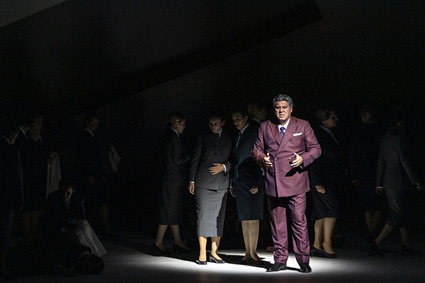| Opera Reviews | 19 April 2024 |
An extraordinary operatic eventby Moore Parker |
|
| Verdi: Simon Boccanegra
Salzburg Festival 18 August 2019 |
|

Luca Salsi (Simon Boccanegra), Ensemble
|
|
|
Andreas Kriegenburg’s stellar cast in this new Simon Boccanegra is launched into a contemporary sphere of communication via cell phones and computer tablets, and with social media serving to spread text messages and propaganda as vehicles to transport the storyline’s dissidence and intrigue. A mélange of costumes (Tanja Hofmann) depicts the new timeline of the plot - here placed within a cooly imposing concrete structure featuring an offset-revolving staircase and expansive platform area for vertical options and effect. The Achilles’ heel of this fairly unspectacular concept (Harald B. Thor) is a floor-to-ceiling semi-translucent curtain which spans two-thirds of the stage for the prologue as well as Amelia’s Act 1 aria, while serving as a projection screen and apron to alternate between chronology and scenic effects. It is conceivable that better options - and in particular, more imaginative lighting (Andreas Grüter) throughout - would have been beneficial. While the actual staging rarely broke the bounds of an updated stereotype, the entire cast did unfold as acutely credible human characters - all displaying exceptional intensity and finely-sculpted definition. At the helm, Luca Salsi recalled memories of great readings belonging to earlier generations - with an ample baritone embodying the tonal essence required for Verdi, fully complimented by the appropriate style and schooling. His consummate legato and unusually broad (and seamless) dynamic options were matched by vital artistic imagination and an intimate ability to communicate and connect with the audience - which indeed place certain legendary names in his shadow. Never have I heard a Boccanegra spin such a perfectly-effortless pianissimo high F to close his Act 1 Duet with Amelia, nor witnessed any predecessor so captivating in the dramatic unfolding of the opera’s final scene. While no Italianate Basso Profondo or Cantante, René Pape has found his way under Fiesco’s cloak to provide an ideal foil for the title lead in his intense and implacable reading. The prologue confrontation with Boccanegra in this performance represented grand opera at its best - and indeed set the mark for the scenes to follow. Charles Castronovo cut a passionate and credible Adorno - utilizing his naturally dusky - yet ringing - timbre with style and a seemingly infallible technique which held true in the precarious benediction segment with Fiesco (in which Pape actually had slight intonation issues), and further blossomed rewardingly to crown his showcase Act 2 aria. A decade has passed since Marina Rebeka’s springboard debut in Salzburg, and her deserved successes and vocal maturity now point toward an increasingly heavier repertoire. Her Boccanegra Amelia is rooted in fine, familiar, qualities - but now in a more generous tone spiked by a new found metal when under pressure above the stave which will undoubtedly well serve forthcoming engagements which include Bellini’s Norma and Leonora in Il Trovatore. André Heyboer’s intensely-sculpted performance here propelled the role of Paolo into the dimensions of a true “lead”, while Antonio Di Matteo’s vigilant and vocally generous Pietro additionally testified that in Salzburg there are no small parts - only luxurious casting. The Konzertvereinigung Wiener Staatsopernchor gave a pristine performance, full of verve and intensity, while the Wiener Philharmoniker appeared soundly prepared for Valery Gergiev’s reading - a suave, perhaps pragmatically understated, kaleidoscope of colour and detail which complimented and united with the stage to make for an extraordinary operatic event.
|
|
| Text ©
Moore Parker Photo © SF / Ruth Walz |
|







